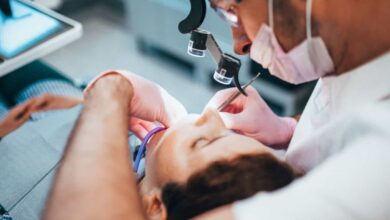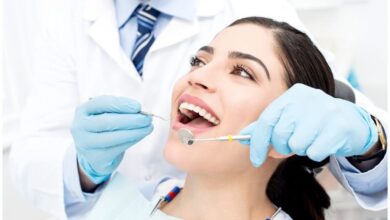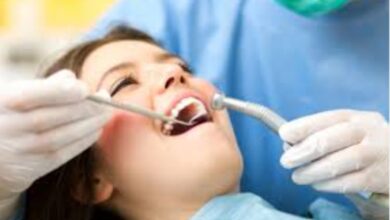Finding the Right Emergency Dentist in Toronto: Your Guide to Immediate Care

Understanding Dental Emergencies
What Qualifies as a Dental Emergency?
Okay, so what actually counts as a dental emergency? It’s more than just a little toothache. We’re talking about situations where you need to see a dentist in Toronto ASAP to prevent serious problems. Think severe pain that won’t go away, uncontrolled bleeding, or a knocked-out tooth. Basically, anything that could lead to permanent damage or needs immediate attention to stop the pain is an emergency.
Common Types of Dental Emergencies
Let’s break down some common scenarios. A severe toothache is a big one – especially if it’s accompanied by swelling or fever. Getting a tooth knocked out during a sports game? Definitely an emergency. What about a cracked or broken tooth from biting into something hard? Yep, that too. An abscess, which is like a pocket of infection, also needs immediate care. And don’t forget about lost fillings or crowns that cause significant pain or sensitivity. Here’s a quick rundown:
- Severe Toothache
- Knocked-Out Tooth
- Cracked or Broken Tooth
- Abscess
- Lost Filling or Crown
Signs You Need Immediate Care
How do you know if it’s really an emergency? Look for these signs. If you’re bleeding from the mouth and can’t stop it, head to the dentist. Intense pain that over-the-counter meds can’t touch is another red flag. Swelling in your face or gums could indicate a serious infection. Also, if you’ve lost a tooth, time is of the essence to try and save it. When in doubt, it’s always better to err on the side of caution and get it checked out. Don’t wait until it gets worse!
Choosing the Right Emergency Dentist
Finding yourself with a dental emergency is stressful, but finding the right dentist doesn’t have to be. It’s important to consider a few things to make sure you get the best possible care when you need it most. Let’s walk through what to look for.
Factors to Consider When Selecting a Dentist
Okay, so you need a dentist, and fast. But before you just pick the first name you see, think about these points:
- Experience: How long has the dentist been practicing? Do they have experience with emergency cases? You want someone who’s seen it all before.
- Technology: Does the clinic use modern equipment? Digital X-rays, for example, can speed up diagnosis. Modern tech often means better, faster care.
- Reviews: What are other patients saying? A few bad reviews aren’t the end of the world, but a consistent pattern of complaints is a red flag.
- Payment Options: Emergency dental work can be costly. Does the dentist offer payment plans or accept your insurance? Knowing this upfront can save you a headache later.
Importance of Location and Availability
When you’re in pain, you don’t want to drive across the city. Here’s why location and availability matter:
- Proximity: The closer, the better. Look for a dentist near your home or work. Time is of the essence in an emergency.
- Hours: Are they open evenings or weekends? Emergencies don’t always happen during regular business hours. A dentist with extended hours is a huge plus.
- On-Call Services: Does the dentist have an after-hours number or an on-call service? Knowing you can reach someone, even late at night, is reassuring.
- Same-Day Appointments: Can they see you right away? A clinic that prioritizes emergency cases and offers same-day appointments is ideal.
Checking Credentials and Experience
Don’t be afraid to do a little digging. It’s your health we’re talking about!
- Licensing: Is the dentist licensed to practice in Ontario? You can usually check this on the Royal College of Dental Surgeons of Ontario website.
- Education: Where did they go to dental school? What kind of continuing education have they had? A well-educated dentist is more likely to be up-to-date on the latest techniques.
- Specializations: Do they have any special training or certifications? If you have a specific issue, like a root canal, you might want a dentist with specialized experience.
- Consultation: Don’t hesitate to ask questions. A good dentist will be happy to explain their qualifications and experience. If they seem evasive, that’s a warning sign.
Emergency Dental Services Offered
Types of Treatments Available
When a dental emergency strikes, knowing what kind of help you can get is really important. Emergency dentist in Toronto aren’t just about pain relief; they also provide a range of treatments to fix the problem and get you back on track. Here’s a rundown of some common services:
- Pain Management: This is usually the first step. Dentists use local anesthetics to numb the area and relieve pain so they can properly assess the situation.
- Tooth Repair: Chipped, cracked, or broken teeth can often be repaired with fillings, crowns, or bonding, depending on the severity of the damage. If you have a piece of a broken tooth, bring it with you! Sometimes, it can be reattached.
- Infection Treatment: Infections, like abscesses, need immediate attention. Dentists might drain the infection and prescribe antibiotics to stop it from spreading.
- Tooth Extractions: Sometimes, a tooth is too damaged to save and needs to be removed. This is usually a last resort, but it’s necessary to prevent further complications.
- Reimplantation: If a tooth gets knocked out, there’s a chance it can be put back in if you act fast. Keep the tooth moist (ideally in milk or saliva) and get to the dentist ASAP.
- Splinting: Loose teeth due to injury can be stabilized by splinting them to adjacent teeth. This gives them a chance to heal properly.
Same-Day Appointments and Urgent Care
The best thing about emergency dental services is that they prioritize getting you seen quickly. A lot of clinics set aside slots for same-day appointments, specifically for emergencies. This means you don’t have to wait days or weeks to get help when you’re in serious pain or have a pressing dental issue. Urgent care services are designed to address immediate needs, providing relief and preventing conditions from worsening. They’ll try to fit you in as soon as possible. Some clinics even offer extended hours or weekend appointments to accommodate emergencies that happen outside of regular business hours.
Preventive Measures to Avoid Emergencies
While emergency dentists are there to help when things go wrong, it’s even better to avoid emergencies in the first place. Here are some things you can do:
- Regular Checkups: Seeing your dentist for regular cleanings and exams can catch problems early before they turn into emergencies. They can spot things like cavities or gum disease and treat them before they cause major issues.
- Good Oral Hygiene: Brushing and flossing every day is key to keeping your teeth and gums healthy. This helps prevent decay, gum disease, and infections.
- Mouthguards: If you play sports, wear a mouthguard to protect your teeth from injury. It’s a simple way to prevent knocked-out or broken teeth.
- Avoid Bad Habits: Don’t chew on ice, bite your nails, or use your teeth to open things. These habits can damage your teeth and lead to cracks or breaks.
- Balanced Diet: Eating a healthy diet that’s low in sugar can help prevent tooth decay. Sugary foods and drinks feed the bacteria in your mouth that cause cavities.
What To Do During a Dental Emergency
Okay, so you’ve got a dental emergency. First off, don’t panic! Easier said than done, I know, but freaking out won’t help your toothache or knocked-out tooth. Here’s a breakdown of what you should do:
Immediate Steps to Take
- Assess the Situation: Is it a minor thing, or are you in serious pain? Is there bleeding that won’t stop? This helps you decide how quickly you need to act.
- Call Your Dentist (or an Emergency Dentist): Seriously, make this your first move. Explain what’s going on. They’ll give you the best advice and get you in ASAP.
- Knocked-Out Tooth: Gently rinse the tooth (if possible, hold it by the crown, not the root). Try to put it back in the socket. If that doesn’t work, keep it in milk or saliva. Time is of the essence here!
- Lost Filling or Crown: If you still have the crown, try to reattach it with dental cement (you can find this at most drugstores), but don’t force it. If you can’t, keep the area clean and see your dentist soon.
- Broken Tooth: Rinse your mouth with warm water. Use a cold compress on your face to reduce swelling.
How to Manage Pain Before Treatment
- Over-the-Counter Pain Relievers: Ibuprofen (Advil, Motrin) or acetaminophen (Tylenol) can help manage the pain. Follow the dosage instructions on the bottle.
- Cold Compress: Apply a cold compress to the outside of your cheek for 15-20 minutes at a time to reduce swelling and numb the area.
- Saltwater Rinse: Rinse your mouth with warm salt water (1/2 teaspoon of salt in 8 ounces of water). This can help clean the area and reduce inflammation.
- Topical Anesthetics: Over-the-counter oral numbing gels (like Orajel) can provide temporary relief.
- Avoid Irritants: Stay away from hot, cold, or sugary foods and drinks that can make the pain worse.
When to Seek Help
- Uncontrolled Bleeding: If you can’t stop the bleeding after applying pressure for 15-20 minutes, go to an emergency room.
- Severe Pain: Pain that doesn’t respond to over-the-counter pain relievers needs professional attention.
- Swelling: Significant swelling in your face or mouth can indicate an infection.
- Fever: A fever along with dental pain is a sign of a serious infection.
- Difficulty Breathing or swallowing: These are signs of a potentially life-threatening infection and require immediate medical attention.
Basically, if you’re unsure, it’s always better to err on the side of caution and get it checked out. Dental problems don’t usually get better on their own!
Preventing Dental Emergencies
It’s true: accidents happen. But honestly, a lot of dental emergencies are avoidable. It’s all about taking care of your teeth and gums before something goes wrong. Think of it like car maintenance – a little effort now can save you a ton of trouble (and money!) later.
Regular Dental Checkups
Seriously, don’t skip those checkups! I know, life gets busy, and going to the dentist isn’t exactly a party. But regular cleanings and exams are super important. Your dentist can spot problems early, like tiny cavities or the start of gum disease, way before they turn into full-blown emergencies. Plus, they can give your teeth a professional cleaning to remove plaque and tartar that you might miss at home. It’s like hitting the reset button for your mouth.
Tips for Maintaining Oral Health
Okay, this is the stuff you hear all the time, but it’s worth repeating because it works:
- Brush twice a day: Morning and night, no excuses. Use fluoride toothpaste and brush for at least two minutes. Set a timer if you have to! I use an electric toothbrush, and it’s a game-changer.
- Floss daily: Yes, every day. Flossing gets rid of the stuff your toothbrush can’t reach. Get the floss picks if regular floss is too annoying. Anything is better than nothing.
- Use mouthwash: An antiseptic mouthwash can help kill bacteria and freshen your breath. It’s a nice addition to brushing and flossing.
- Eat a healthy diet: Lay off the sugary drinks and snacks. They’re terrible for your teeth. Instead, load up on fruits, vegetables, and dairy products. Your teeth will thank you.
Avoiding Common Risks
This is where you have to think about your habits. Do you chew on ice? Use your teeth to open bottles? Play sports without a mouthguard? These things can all lead to dental emergencies. Here’s the deal:
- Don’t use your teeth as tools: Find a bottle opener, scissors, or whatever. Your teeth are for chewing food, not ripping open packages.
- Wear a mouthguard when playing sports: Even if it’s just a casual game of basketball, protect your teeth. A mouthguard can prevent serious injuries.
- Be careful with hard foods: Nuts, hard candies, and even popcorn kernels can crack your teeth. Chew carefully, and maybe avoid the really risky stuff altogether.
- Address teeth grinding: If you grind your teeth at night, talk to your dentist about a mouthguard. Grinding can wear down your teeth and make them more prone to damage.
Basically, a little common sense and consistent oral hygiene can go a long way in preventing dental emergencies. Take care of your teeth, and they’ll take care of you!
Aftercare Following Emergency Treatment
So, you’ve just been through a dental emergency – not fun, right? But the work doesn’t stop the second you leave the dentist’s chair. What you do after your emergency treatment is super important for healing and making sure you don’t end up back in the same situation. Here’s the lowdown on what to expect and how to handle it.
Post-Treatment Instructions
Okay, listen up because this is where a lot of people mess up. Your dentist should give you specific instructions tailored to your situation. Don’t just nod and smile – actually listen and maybe even write it down. These instructions could include:
- Pain Management: They might prescribe pain meds or recommend over-the-counter stuff like ibuprofen. Take it as directed! Don’t try to tough it out if you don’t have to.
- Dietary Restrictions: Soft foods are your friend for a while. Think yogurt, soup, mashed potatoes. Avoid anything hard, crunchy, or super chewy that could irritate the area.
- Oral Hygiene: Gently rinse your mouth with warm salt water a few times a day. Be careful when brushing around the treated area – you don’t want to dislodge anything or cause more irritation.
- Activity Restrictions: Lay low for a day or two. Avoid strenuous activity that could increase blood flow to the area and cause bleeding or swelling.
Signs of Complications to Watch For
Even if you follow all the instructions perfectly, sometimes things can still go sideways. Keep an eye out for these red flags:
- Increased Pain: A little discomfort is normal, but if the pain gets worse instead of better, call your dentist.
- Excessive Bleeding: Some bleeding is expected, but if it’s soaking through gauze every few minutes, that’s not good.
- Swelling: A bit of swelling is normal, but if it’s severe or spreading, get it checked out.
- Fever: A fever could be a sign of infection.
- Bad Taste or Odor: This could also indicate an infection.
Basically, if anything feels “off,” don’t hesitate to call your dentist. It’s always better to be safe than sorry.
Follow-Up Care and Appointments
Don’t skip your follow-up appointments! These are important for your dentist to check on your healing and make sure everything is progressing as it should. They might need to adjust your treatment plan or address any complications that have arisen. Think of it like this: the emergency treatment was just the first step. The follow-up care is what ensures long-term success. Plus, they can give you more personalized advice on how to prevent future dental dramas. Nobody wants to go through another emergency, right?
Finding Emergency Dental Care in Toronto
Okay, so you’ve got a dental emergency in Toronto. What now? Finding the right help fast is super important. Here’s the lowdown on how to locate emergency dental care in the city.
Local Resources and Clinics
Toronto has a bunch of dental clinics that offer emergency services. Many general dentistry practices set aside slots for urgent cases. A quick search for “emergency dentist Toronto” will give you a list of options. Don’t just pick the first one, though. Check if they’re actually open and how soon they can see you. Some clinics even specialize in cosmetic dentistry in Toronto, so if your emergency involves a front tooth, that might be a bonus.
Online Reviews and Recommendations
Before you commit to an emergency dentist in Toronto, take a peek at their online reviews. Google, Yelp, and other review sites can give you an idea of what other patients think. Look for comments about their responsiveness, pain management, and overall quality of care. Of course, take reviews with a grain of salt, but a consistent pattern of positive or negative feedback can be really helpful. Also, ask friends or family if they have any recommendations for a good dentist in Toronto. Personal referrals are often the best!
Emergency Hotlines and Contacts
Sometimes, you need immediate help figuring out where to go. Toronto Public Health might have a hotline or referral service for dental emergencies, especially for those who can’t afford immediate treatment. Also, your regular dentist (if you have one) might have an after-hours number or an answering service that can point you in the right direction. Keep these numbers handy, just in case. And remember, if you’re dealing with a severe injury or uncontrolled bleeding, head straight to the nearest hospital emergency room. They can stabilize you and then refer you to an emergency dentist for follow-up care, maybe even for dental fillings in Toronto if needed.
Wrapping It Up: Your Emergency Dental Care Plan
Finding the right emergency dentist in Toronto doesn’t have to be a headache. Just remember to keep a list of local clinics handy, know what qualifies as an emergency, and don’t hesitate to reach out if you’re unsure. The sooner you get help, the better your chances of a quick recovery. Whether it’s a toothache or a broken tooth, having a plan can make all the difference. So, take a deep breath, stay calm, and know that help is just a call away.




